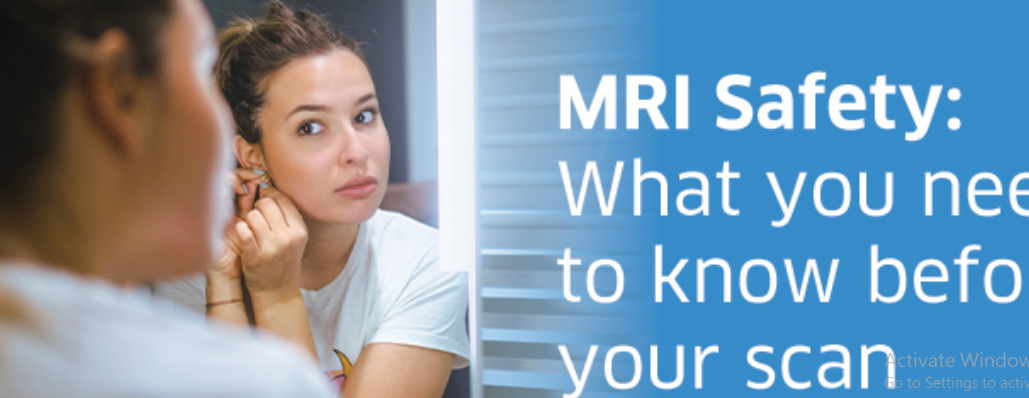Safety During MRI: What You Need to Know Prior to Scanning for a Safe Experience. MRI is an important modality through which doctors are able to view the inside of the body. It always is very important that one understands MRI safety to ensure an easy and safe experience during his or her scanning. Many persons will feel apprehensive about what to expect; the more they know, the less anxious they will be.
Safety precautions come into play when considering an MRI. For example, any medical device or any kind of metal implant that is in the body must be elaborated before the scanning because it is in contradiction to the scanning. Preparation for what is needed beforehand enables one to be mentally and physically set for the procedure.
These safety measures help protect the patient, and understanding them helps the patient feel more comfortable during the scan. A little preparation makes the MRI process a lot easier and less intimidating.
Key Concepts
- Safety in MRI involves knowledge of procedures and equipment used.
- The patient should always inform about implants and medical conditions.
- Preparation can reduce anxiety and improve the scanning experience.
Principles of MRI Safety
MRI safety depends on the understanding of some key elements, which concern magnetic fields, radio-frequency energy, and their biological effects. Understanding such concepts helps to ensure safety regarding MRI studies.
Basic Principles of Magnetic Field
MRI machines create images of the body using very strong magnetic fields. The strength of these is measured in a unit called teslas. Common machines usually operate at 1.5T or at 3T. Stronger fields will produce sharper images but may also present more risks.
These magnets can pull on any metal objects. Watches, credit cards and any type of jewelry needs to be removed before one enters the MRI room. Additional implants like some kinds of clips or pacemakers, are to be avoided in an MRI setting because of the magnetism.
Patient Preparation
The patients must be queried about the presence of metal in their body. Safety screening safeguards everyone within the vicinity.
Radiofrequency Energy
MRI machines also use radiofrequency energy in order to excite hydrogen atoms in the body. The energy produces signals, which are converted by the machine into images. RF energy does not usually present any problem, but certain precautions may be taken.
During a scan, the body can absorb certain amounts of RF energy, causing heating. This usually presents only a minimal change in temperature. However, certain patients, such as those having specific implants, need careful monitoring.
Patients should discuss any concerns about RF energy with the medical team before the examination. In this way, an appropriate procedure can be carried out with safety by realizing any particular risks.
Biological Effects of MRI Fields
Only a few studies have indicated that the magnetic fields and RF energy used in MRI precipitate damage to either DNA or any long-term health effects. Research has shown that most studies indicate MRI is safe for most individuals. However, there is a differential that may need special caution for some populations: pregnant women and those with specific medical conditions.
Common temporary effects include lightheadedness or discomfort from the confined space and loud noises. Patients should not hesitate to mention their discomfort to the MRI staff during the scan.
Understanding these biological interactions allows a patient to be an informed decision-maker regarding his or her MRI scan. Safety first is an important concern with any medical imaging.
Pre-Scan Safety Procedures
A variety of safety procedures have been followed before an MRI scan to protect a patient. These help in the identification of possible risks and allow the scanning process to be as safe as possible.
Screening for Contraindications
Medical history and current health concerns will be asked by the healthcare professional prior to the examination. The review is very crucial in determining any contraindications such as conditions that will make it unsafe for a patient to undergo an MRI.
The following are some relevant questions that might be asked:
- Are you allergic to anything, especially contrast agents?
- Are you pregnant or suspect you are?
- Have you ever had an adverse reaction to anesthesia?
If certain conditions are present in the patient, such as severe renal failure, then other modalities may be indicated. This precautionary evaluation will avoid complications from the scanning procedure.
Principle of Safe Use of Contrast Agents
Some MRI exams utilize a contrast dye to enhance the pictures. This dye allows the doctor to see greater detail in organs and vessels. Before any contrast is given, the provider reviews the patient’s kidney function and any allergy history.
Key Facts:
The client should always inform the technologist if they have any allergies.
A blood test to check kidney function may be ordered prior to giving contrast.
If the patient is experiencing unusual symptoms, they must immediately communicate their concern.
Understanding these variables well ensures that the practice of using contrast agents will always be safe and effective.
Implants and Devices Considerations
Patients with metal implants or devices should make their healthcare provider aware of such conditions. Some implants may react to the magnetic field generated by the MRI, which could cause injuries.
The following are some of the common implants that patients must reveal:
- Pacemaker
- Metal plates, screws, and rods
- Cochlear implants
Not all implants are safe in an MRI setting. The knowledge of which devices have been implanted would help in deciding the correct MRI protocols that must be applied or if another imaging modality needs to be considered. This step is important in assuring patient safety throughout the process.

Also Read :
